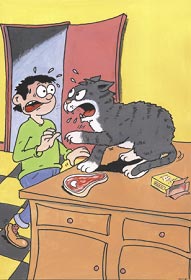What is it?
Cat aggression can be a serious and
dangerous behavior problem.
There are many reasons why cats become aggressive. The most
common cause of aggression is fear.

Why
do cats become aggressive?
Aggression can also be triggered by physical
illness or discomfort. Rule out this
cause of aggression by taking your cat to your regular
veterinarian for a thorough physical examination and diagnostic
tests.
Types of feline
aggression: fear, territorial, parental, play,
redirected, predatory, petting-induced, pain-induced, social
status, medical, learned.
What is situational aggression?
Sometimes,
aggression is situational. In other words, certain circumstances
trigger the cat's aggression.
The
aggression can be specific to one
family member, strangers, other pets in the household, or
to strange pets.
Keeping a behavioral diary helps identify these circumstantial
triggers.
|
A change in your
cat's behavior may
be the first sign of
physical discomfort
or illness. When in
doubt, have your
veterinarian check
it out. |
What to do
Once medical
causes are ruled out, the next
step is to complete a pet
behavioral history analysis by a
veterinary behavior consultant
to
determine the probable causes of
the aggression and the
prognosis for
improvement if going forward
with effective
treatment and behavior modification.
Cats often display more than one type
of aggression. Treatment usually includes behavior modification
and changes to the cat's environment.
Behavior medicine therapy may also be
helpful for some forms of aggression.